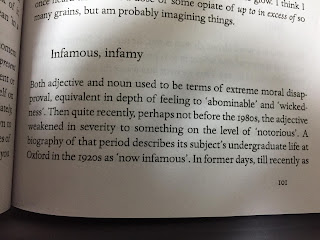Infamously
I am indebted to Justin Isis for sending me photographs of sample pages from Kingsley Amis's The King's English, two of which I hope I can inset below. Together they should provide us with one entry from Amis's book.
The entry in question is on the words 'infamous' and 'infamy'.
These photographs were sent on the 30th of January 2022. It is the 4th of February 2022 as I write this. It just so happened that earlier today, I came across an example of the usage of which Amis complains. The book in which it appears is A Priori by Edwin Mares, a work on epistemology. The sentence is as follows:
"As we saw in [Section] 3.6, Descartes also, infamously, holds that we have an innate idea of God, which he uses to prove that his ideas about the world are accurate."
In case it is hard to read in the inset pictures, here is what Amis writes:
"Both adjective and noun ['infamous' and 'infamy'] used to be terms of extreme moral disapproval, equivalent in depth of feeling to 'abominable' and 'wickedness'. Then quite recently, perhaps not before the 1980s, the adjective weakened in severity to something on the level of 'notorious'. A biography of that period describes its subject's undergraduate life at Oxford in the 1920s as 'now infamous'. In former days, till recently as I say, you or your behaviour were registered as infamous at the time and you or it stayed that way; the notion of becoming infamous long afterwards was meaningless."
Et cetera.
The sentence from Mares appears on page 56 of his work. On page 50 he writes:
"Descartes thought it self-evident that our minds are 'thinking substances' and cannot be identical to our bodies. It seems likely that this is false too."
Mares gives no reason for this apparent 'likelihood'. The least we can say is that he is less than impartial when it comes to Descartes. I am also prompted to wonder exactly what he means by the now-ambiguous word 'infamously', and also to question whether his attitude towards Descartes shows up in the use of a word, conspicuously sandwiched between commas, that has a slippery history. Can he really mean the word as Amis tells us it was originally meant? Surely not. But perhaps he himself does not know exactly what he means here.
I would be interested to learn, if such a thing could be studied, what the exact correlation might be between abuse or questionable use of words and the prejudices of the person using them.
I am also reminded of the following short article about philology from a few years ago:
https://aeon.co/ideas/why-philosophers-should-hang-out-at-the-humanists-parties


Comments
Post a Comment